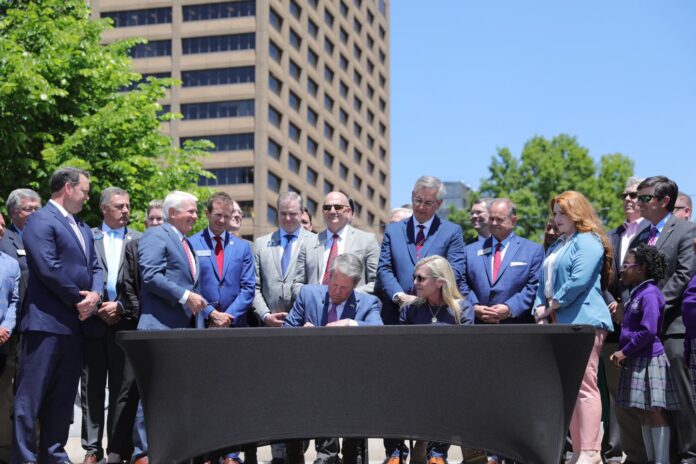
(GA Recorder) — Gov. Brian Kemp signed a suite of education-related bills into law Tuesday, including a controversial measure that will allow parents of children in low-performing schools to claim $6,500 in state education funds to pull their children out of the public system and enroll them in private school or teach them at home.
Supporters say expanding school vouchers will help kids in schools that don’t meet their needs succeed academically. Opponents say they siphon needed dollars from underfunded public schools to private institutions with less oversight.
Kemp thanked the bill’s author, Cumming Republican Sen. Greg Dolezal, and House Speaker Pro Tem Jan Jones for working on the bill for years before it finally passed this year.
“I am grateful for that dedication because this legislation has always been about one thing, providing every Georgia child the opportunity to get the education that they deserve,” Kemp said. “To ensure that participating schools are living up to that promise, they must demonstrate their own sound financial footing and submit student performance data before enrolling students, and they must administer an education savings authority approved assessment to ensure quality student performance.”
Those additions Kemp mentioned were sweeteners added to help convince Republican holdouts in the House to support the measure. Other additions make temporary teacher pay raises approved over the last few years permanent and allow public schools to use state capital construction dollars to build or renovate Pre-K facilities.
The program is set to go into effect for next year’s fall semester and is limited to students zoned into the lowest 25% of Georgia schools. Except for kindergartners, participants must have been enrolled in public school for at least a year to qualify. The cost to the state is capped at 1% of the cost of the Quality Basic Education formula used to determine the state’s school funding share, which now equals more than $100 million.
Though some House members needed convincing, Lt. Gov. Burt Jones indicated the Senate is ready to move further.
“As a longtime proponent of school choice, I am proud of the General Assembly for passing the most substantive initiative in decades,” Jones said. “I want to thank Gov. Kemp for his support for school choice and education freedom within our state. Today’s signing of SB 233 is a great step in the right direction, however, there is still more work to be done to give parents the choice and resources that can meet their child’s unique educational needs. I look forward to working with Governor Kemp and my colleagues in the General Assembly to ensure educational freedom in Georgia.”
Many education leaders were not cheering as Kemp affixed his signature to the bill. Teachers and education lobbyists have long complained that the voucher bill will leave already cash-strapped schools with less money. In a virtual news conference hosted by the Intercultural Development Research Association Association following the bill’s signing, activists lamented what they called a rushed and non-transparent process that led to the bill’s passage and predicted that it will do little to help the families proponents say it will because $6,500 is not enough to pay for tuition at most Georgia private schools, which tend to be clustered around major metro areas.
Elijah Brawner, a divinity student at Emory University, said every private school in his area is Christian-based, which would further alienate some students.
“So if you can get a public school voucher and that lets you leave your supposedly terrible public schools and take your money with you, first of all, the voucher doesn’t cover the whole tuition,” he said. “So now you’re only letting people come through who can already afford to pay partial tuition through subsidizing students above a certain income level, and you’re not subsidizing any students that are of a diverse faith background.”
Tracey Nance, the 2022 Georgia Teacher of the Year, said she is concerned that families who take advantage of the program may be exposed to legal discrimination and give up rights that public school families would have.
“The private schools that accept these publicly funded vouchers are not held to the same standards as public schools, and they are in fact even legally allowed to discriminate,” she said. “They have little oversight students will not be required to take the same accountability test as the rest of Georgia students, they will not be held to the same instructional standards. Even more when parents use this voucher they waive all rights to federal protection and public education services, including services for students with disabilities and services such as transportation and school meals.”







